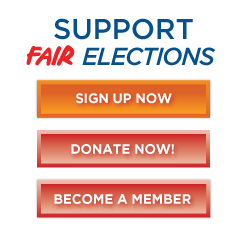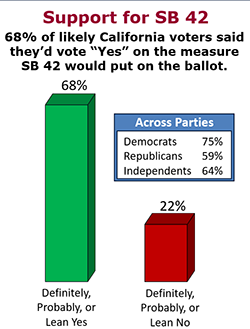You and I have been here before, with me recommending
something you don't want to hear about, even though it'll
be good for you.
No, I didn't get another colonoscopy. I'm talking about
those three dreaded words: Campaign finance reform.
Have your eyes already glazed over because the subject can
be so tediously dull? If so, snap out of it and pay
attention, because money in politics is a force beyond
evil, and it's on full display all around us right now.
On the national scene, already more than $322 million has
been raised in support of candidates for president, with
$56 million of that going into Super PACs. Do you know what
a Super Political Action Committee is?
It's a slap in your face.
Someone sets up a little club and calls it something like
the Apple Pie and Cuddly Kittens Committee or the American
Sunshine and Pride Fund, and then the richest people in the
world can donate UNLIMITED amounts to the PACs in support
of a candidate, so long as they don't coordinate spending
the money with the pol's campaign.
We can thank a sadly misguided U.S. Supreme Court decision
for this wink-and-nod arrangement, which has already
brought us a flood of attack ads and obscene distortions
that dumb down national discourse and give any clown with a
billionaire friend a fighting chance.
But today, let's scratch an irritation that's closer to
home.
One month ago, a modest, perfectly sensible reform proposal
came up for a vote in the state Assembly. The California
DISCLOSE Act (AB 1148), sponsored by the California Clean
Money Campaign, was carried by Assemblywoman Julia Brownley
(D-Santa Monica). It proposed that all political
advertising for ballot measures be required to carry the
names of the top three funders of the ads, along with their
logos. Super PACs and the like would also have had to
display their top three funders in candidate ads they
funded. The bill also would have required ads to list a
website where voters could get more scoop on the
funders.
In 2010, says Clean Money's Trent Lange, most of the $235
million spent on ballot measures was by "veiled actors
hiding behind innocuous-sounding names like Stop Hidden
Taxes or the California Jobs Initiative." The largest
funders, in both those cases, were oil companies.
Simple enough, right? A baby step, really, so that if
voters feel like they're getting mugged, they can at least
identify the suspects, whether they're corporations, public
employee unions or individuals.
But in Sacramento, the bill was crushed like a cockroach.
It died on Jan. 31, failing by two votes to win the needed
two-thirds majority when only one Republican (Nathan
Fletcher of San Diego) voted for it, and one Democrat
(Cathleen Galgiani of Tracy) voted against.
Assemblyman Don Wagner (R-Irvine) told The Times the bill
ran "afoul of the 1st Amendment." Then he quoted the U.S.
Supreme Court, saying "Anonymity is a shield from the
tyranny of the majority."
Hogwash. How about the tyranny of cynical forces who want
to keep voters in the dark?
As Lange notes, a Field poll last fall showed an
overwhelming rainbow coalition of support for more
disclosure, with 78% of Republicans in favor, 86% of
Democrats and 88% of independents. That's why the bill (now
called AB 1648) has been reintroduced by Brownley, but this
time, San Diego's Fletcher has stepped up to partner with
her.
"I don't understand how you can be against transparency and
I don't understand how you can be against disclosure,"
Fletcher told me.
He said that the state Chamber of Commerce lobbied against
the bill and that it also made the 1st Amendment argument.
But he wasn't buying it.
"When we hide" the source of money, Fletcher said, "we're
saying it improperly influences us." I couldn't have said
it better.
Brownley said a Greenlining Institute poll found that 59%
of voters would be less inclined to vote for a candidate
who opposed disclosure. "I think sitting legislators need
to have their eyes wide open to statistics like that," said
Brownley.
And yet, though she's optimistic about prevailing this time
in the Assembly, Brownley and Lange both say Senate
approval is no sure thing. It's another shocking example of
how out of touch legislators can be with public
sentiment.
"To me, nothing is as fundamental to fixing our broken
democracy as fixing the corruptive effects of money in
politics," said Lange.
Lange is a computer guy who joined Clean Money nine years
ago as a volunteer, determined to improve the website and
help grow the reform movement. But he got hooked, inspired
in part by the nonprofit's thousands of volunteers
statewide. Two years ago, he became executive director, and
he makes lots of lobbying trips to Sacramento in a
convertible Corvette with the license plate CLN MONY.
If he had his way, all campaigns for legislative and
statewide office would be paid for with public financing,
and Lange said that would cost about $6 per adult. Of
course, critics always complain that they don't want their
tax dollars paying for candidates they don't know or like.
But Lange wonders if the price of coffee and a doughnut is
really too much to ask for a system in which special
interests would have no greater influence than private
individuals.
We're a long way from that ever happening, but the DISCLOSE
Act is at least a possibility. You can learn more about the
details of the bill, and how to sign a petition in support
of it, at http://www.CAclean.org.
One of the more compelling arguments in favor of disclosure
is a simple question, and it can be addressed to both
legislators and campaign donors:
What do they have to hide?
steve.lopez@latimes.com




